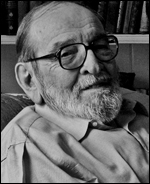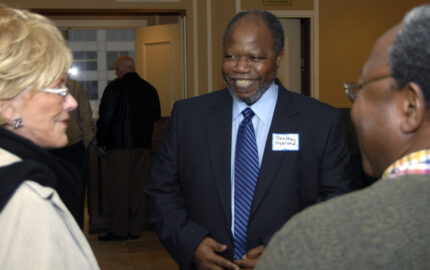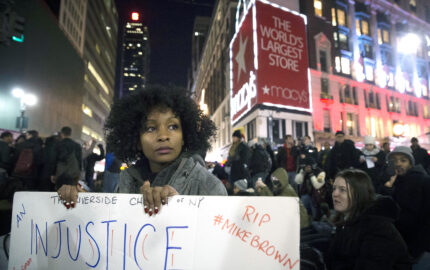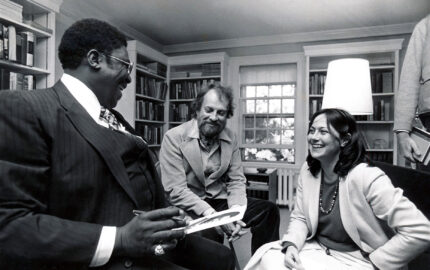Larry L. King, NF '70, a journalist, playwright and author whose work often dealt with his home state of Texas, died of emphysema in Washington, D.C. on December 20th. He was 83. King was best known for co-writing the hit Broadway musical "The Best Little Whorehouse in Texas," which began as an article for Playboy in 1974 and was nominated for a Tony Award in 1979. He also wrote six other plays, numerous magazine articles, and more than a dozen books, including the 1972 National Book Award finalist "Confessions of a White Racist." He won a 1981 Emmy award for writing the CBS documentary "The Best Little Statehouse in Texas." His last book, published in 2006, was "In Search of Willie Morris: The Mercurial Life of a Legendary Writer and Editor."
There was only one Larry L. King, unless you count Molly Ivins. Both made a career of telling people outside of Texas what we Texans are like. And both were adept at sharp-edged humor to skewer the banal, hypocritical and idiotic things that happen in our state.
Read King's obituary in The New York Times.Larry's serendipitous Playboy story about "The Best Little Whorehouse in Texas" became a writer's home run for him. It was turned into a musical about the state closing the brothel in La Grange. "Whorehouse" ran for 1,584 shows on Broadway and in regional playhouses for years. It also made Larry rich, allowing him to write pretty much whatever he wanted.
In 1981, he returned to Texas to make a television documentary called "The Best Little Statehouse in Texas." I helped update him on the current political players and their games. The documentary won an Emmy for Larry in 1982.
In 1984, we both covered the Republican National Convention in Dallas. Larry had quit drinking, but said he enjoyed an away-from-home hiatus now and then. So I joined him. My friend Sarge Carleton, a drummer from my first rock band in Austin, showed up with a peace pipe. We shared it. Not sure if we furthered peace, but we laughed a lot.
Willie Morris mentored Larry. He gave him his first national exposure and helped Larry become a full-time writer after a decade on congressional staffs. Willie had been editor of The Texas Observer, for which Larry had written articles. Willie then became editor in chief at Harper's Magazine, and Larry's writing career took off.
Willie sponsored Larry for the Nieman Fellowship. Larry sent a letter to Willie, supposedly from an official a notch or so down from Harvard president Nathan Pusey. The letter was read at Larry's memorial service in Austin. Harvard's complaints about Larry's conduct—laughing out loud in classes and calling professors "junior"—also included that, since Harvard didn't have the astrology and Christian Science classes Larry wanted, he shall "wait it out in the Kings Men's Bar," a place of low repute among Harvard gentlemen. "This is perhaps a good time," the letter continued, "to relate that Mr. King exhibits certain hostilities, not always repressed, in insisting on giving a pronunciation to President Pusey's name that is neither appreciated by the President nor out of the realm of the vulgar."
Yep, Larry was that kind of guy. May he rest in peace.
Dave McNeely, NF '76, came to Harvard from The Dallas Morning News. McNeely and Nieman classmate Jim Henderson co-wrote "Bob Bullock: God Bless Texas," about the most powerful lieutenant governor in Texas history, whose tenure overlapped those of Democratic Gov. Ann Richards and Republican Gov. George W. Bush. McNeely writes a weekly column on Texas politics for almost three dozen Texas newspapers.
There was only one Larry L. King, unless you count Molly Ivins. Both made a career of telling people outside of Texas what we Texans are like. And both were adept at sharp-edged humor to skewer the banal, hypocritical and idiotic things that happen in our state.
Read King's obituary in The New York Times.Larry's serendipitous Playboy story about "The Best Little Whorehouse in Texas" became a writer's home run for him. It was turned into a musical about the state closing the brothel in La Grange. "Whorehouse" ran for 1,584 shows on Broadway and in regional playhouses for years. It also made Larry rich, allowing him to write pretty much whatever he wanted.
In 1981, he returned to Texas to make a television documentary called "The Best Little Statehouse in Texas." I helped update him on the current political players and their games. The documentary won an Emmy for Larry in 1982.
In 1984, we both covered the Republican National Convention in Dallas. Larry had quit drinking, but said he enjoyed an away-from-home hiatus now and then. So I joined him. My friend Sarge Carleton, a drummer from my first rock band in Austin, showed up with a peace pipe. We shared it. Not sure if we furthered peace, but we laughed a lot.
Willie Morris mentored Larry. He gave him his first national exposure and helped Larry become a full-time writer after a decade on congressional staffs. Willie had been editor of The Texas Observer, for which Larry had written articles. Willie then became editor in chief at Harper's Magazine, and Larry's writing career took off.
Willie sponsored Larry for the Nieman Fellowship. Larry sent a letter to Willie, supposedly from an official a notch or so down from Harvard president Nathan Pusey. The letter was read at Larry's memorial service in Austin. Harvard's complaints about Larry's conduct—laughing out loud in classes and calling professors "junior"—also included that, since Harvard didn't have the astrology and Christian Science classes Larry wanted, he shall "wait it out in the Kings Men's Bar," a place of low repute among Harvard gentlemen. "This is perhaps a good time," the letter continued, "to relate that Mr. King exhibits certain hostilities, not always repressed, in insisting on giving a pronunciation to President Pusey's name that is neither appreciated by the President nor out of the realm of the vulgar."
Yep, Larry was that kind of guy. May he rest in peace.
Dave McNeely, NF '76, came to Harvard from The Dallas Morning News. McNeely and Nieman classmate Jim Henderson co-wrote "Bob Bullock: God Bless Texas," about the most powerful lieutenant governor in Texas history, whose tenure overlapped those of Democratic Gov. Ann Richards and Republican Gov. George W. Bush. McNeely writes a weekly column on Texas politics for almost three dozen Texas newspapers.




